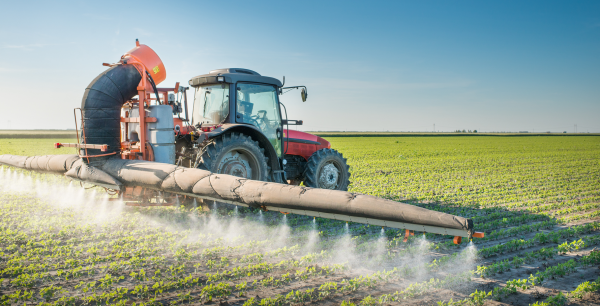Europa moet wachten op burgerinitiatief glyfosaat
“Glyfosaat-licentie niet verlengen vóór behandeling burgerinitiatief”
De Partij voor de Dieren eist van de Europese Commissie dat ze de Europese licentie voor landbouwgif glyfosaat niet verlengt, voordat het onlangs officieel geregistreerde Europees burgerinitiatief ‘Ban Glyphosate‘ volledig is behandeld. Europarlementariër Anja Hazekamp wil garanties van de Europese Commissie dat het initiatief serieus wordt meegewogen bij de beslissing over glyfosaat.

“Het vertrouwen in de EU is bij veel burgers tot een nulpunt gedaald. Brussel kan het zich niet veroorloven om burgerinitiatieven te negeren,” aldus Europarlementariër Anja Hazekamp.
De huidige EU-licentie voor glyfosaat loopt begin 2018 af en valt samen met de eindtermijn van het burgerinitiatief ‘Ban Glyphosate’, dat op 25 januari officieel van start gaat. De indieners van het initiatief hebben twaalf maanden de tijd om minimaal 1 miljoen handtekeningen te verzamelen. Als dit lukt moet de Europese Commissie een hoorzitting organiseren en gemotiveerd antwoord geven op het verzoek om glyfosaat te verbieden. “Het zou respectloos en ondemocratisch zijn als op het moment van de hoorzitting het besluit over glyfosaat al is genomen,” zegt Hazekamp.
Volgens de in kankeronderzoek gespecialiseerde tak van de Wereldgezondheidsorganisatie, IARC, is glyfosaat waarschijnlijk kankerverwekkend. Daarnaast zijn er aanwijzingen dat glyfosaat een hormoonverstorende werking heeft. Toch besloot de Europese Commissie in juni 2016 om de EU-licentie voor glyfosaat met achttien maanden te verlengen. Aanvankelijk wilde de Commissie de licentie zelfs met vijftien jaar verlengen, maar dankzij protest van verschillende EU-landen en Europarlementariërs werd dit voorkomen.
De Partij voor de Dieren maakte zowel in de Tweede Kamer als in het Europees Parlement bezwaar tegen het op de markt houden van glyfosaat.
Glyfosaat is een landbouwgif en het hoofdbestanddeel Roundup. Roundup wordt door boeren, overheden en particulieren gebruikt als onkruidverdelger. Door het massale gebruik komen veel mensen en dieren met het gif in aanraking. Onderzoek uit 2013 wijst uit dat 63 procent van alle Nederlanders sporen van glyfosaat in hun urine had.
“No extending of glyphosate license until citizens’ initiative is fully considered”
The Party for the Animals demands that the European Commission does not extend the European license for herbicide glyphosate until the recently officially registered European citizens’ initiative ‘Ban Glyphosate’ has been fully considered. MEP Anja Hazekamp wants the European Commission’s guarantee that the initiative will be taken into serious account with regard to their decision on the glyphosate license.

“Many citizens have lost all faith in the European Union. Brussels cannot afford to ignore citizens’ initiatives,” according to MEP Anja Hazekamp.
The current EU glyphosate license grant will expire at the start of 2018, coinciding with the end date of the citizens’ initiative ‘Ban Glyphosate’, which was officially launched on 25 January. The proposers of the initiative have 12 months to collect one million signatures. If they succeed, the European Commission will be forced to organise a hearing and give a fully reasoned response to the request to ban glyphosate. “It would be disrespectful and undemocratic if a decision on the glyphosate license is already reached at the time of the hearing,” says Hazekamp.
The section of the World Health Organisation that specialises in cancer research, IARC, has classified glyphosate as a probable carcinogen. In addition, there are indications that glyphosate is an endocrine disrupter. Nevertheless, in June 2016 the European Commission decided to extend the EU license for glyphosate by 18 months. Initially, the Commission even planned on extending it for 15 years, but this was avoided due to protests from several EU countries and MEPs.
The Party for the Animals has objected to continued placing on the market of glyphosate in both the Lower House and European Parliament.
Glyphosate is an agricultural toxin, its main ingredient Roundup. Roundup is used by many farmers, governments and individuals as a herbicide, and as a result of this mass use, a lot of people and animals come into contact with the toxin. A 2013 research showed that 63% of the Dutch population had traces of glyphosate in their urine.